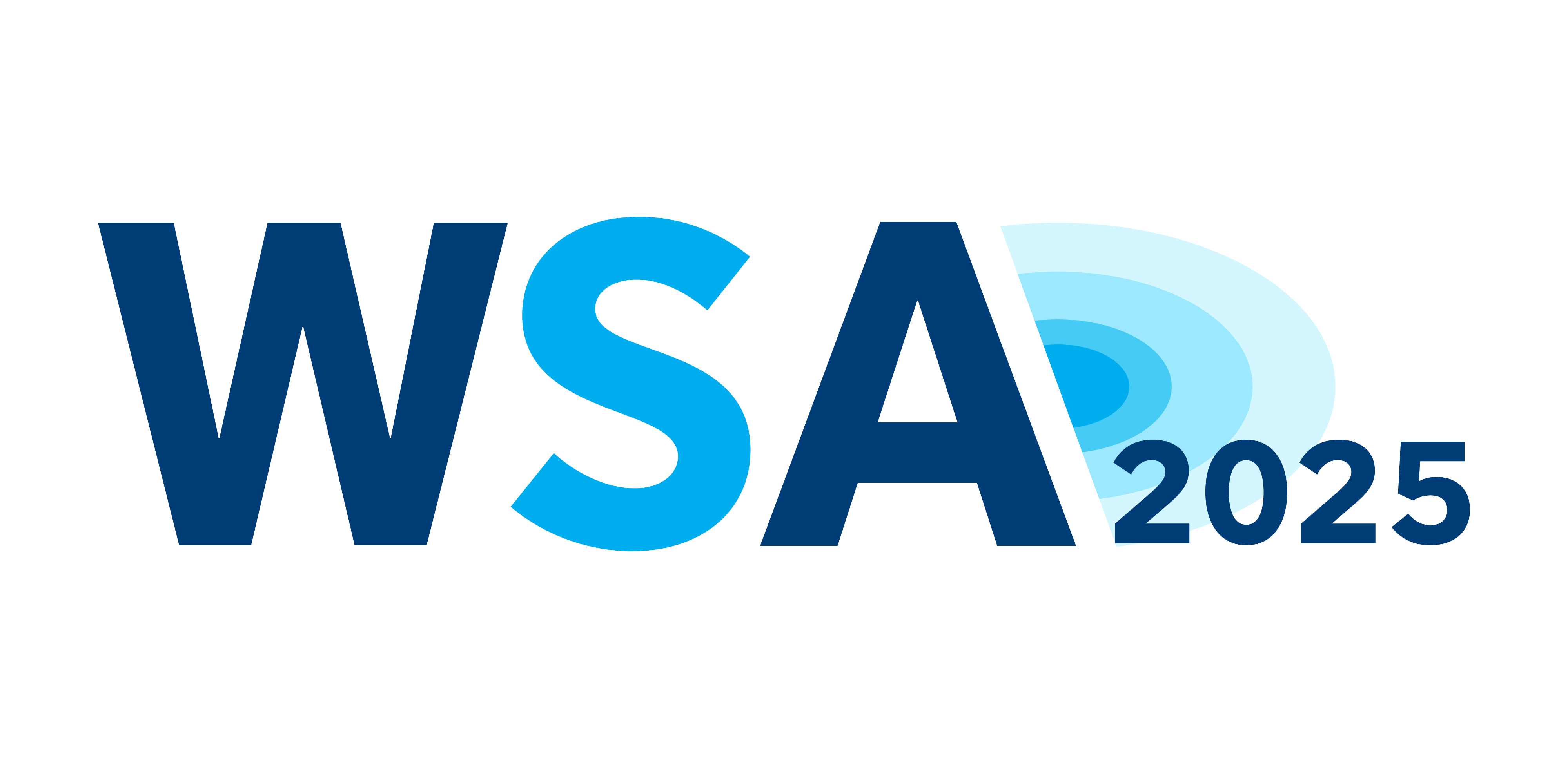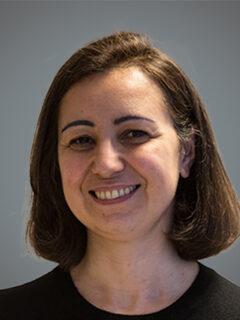Prof. Dr. Laura Cottatellucci
Laura Cottatellucci obtained the Habilitation from University for Nice-Sophia Antipolis (2015, France), the PhD in Electrical Engineering and Information Technology Sciences from Technische Universität Wien (2006, Austria), and the Master degree in Electrical Engineering from La Sapienza University, Rome (1995, Italy).
Since December 2017, she is Professor for Digital Communications at the Institute of Digital Communications of Friedrich-Alexander Universität (FAU) Erlangen-Nürnberg (Germany) and Adjunct Professor (since March 2018) at the Dept. of Communication Systems at EURECOM. Prior to joining FAU, she was Associate Professor (July 2016-Nov 2017) and Assistant Professor (Dec. 2006-June 2016) at EURECOM. From January to November 2006 she was Research Fellow at University of South Australia, Australia, working on information theory for networks with uncertain topology and in INRIA, Sophia Antipolis, France (October-December 2005). From April 2000 to September 2005, she worked as Senior Researcher at Forschungszentrum Telekommunikation Wien, Austria, on CDMA, MIMO, and satellite systems. From 1995 until 2000, she was with Telecom Italia as responsible of industrial projects after specialization in networking at the Telecom Italia School for Advanced Studies Guglielmo Reiss Romoli (1996, Italy). She held visiting appointments at EURECOM (France- 2005), FAU Erlangen-Nürnberg (Germany, 2010), and NTNU Trondheim (Norway, 2005, 2007).
Laura Cottatellucci currently is an associate editor for IEEE Transactions on Communications (since September 2015) and IEEE Transactions on Signal Processing (February 2016) and served as guest editor for EURASIP Journal on Wireless Communications and Networking (special issue on cooperative communications). In Mach 2018 she received the award as best editor for IEEE Transactions on Signal Processing. She is an elected member of the IEEE Technical Committee on Signal Processing for Communications and Networking. Her research interests lie in the field of communications theory and signal processing for wireless communications, satellite, and complex networks. Her contributions in these fields are based on the application of mathematical tools such as random matrix theory, optimization, and game theory.
- , , , , , , :
Optimal Transmit Signal and Beamforming Design for Integrated Sensing and Power Transfer Systems
In: IEEE Open Journal of the Communications Society (2025), p. 1-1
ISSN: 2644-125X
DOI: 10.1109/OJCOMS.2025.3546806
- , , :
Distributed Joint User Activity Detection, Channel Estimation, and Data Detection via Expectation Propagation in Cell-Free Massive MIMO
2024 IEEE 25th International Workshop on Signal Processing Advances in Wireless Communications (SPAWC) (Lucca, 2024-09-10 - 2024-09-13)
In: 2024 IEEE 25th International Workshop on Signal Processing Advances in Wireless Communications (SPAWC), New York City: 2024
DOI: 10.1109/SPAWC60668.2024.10694527 - , , :
Bilinear Expectation Propagation for Distributed Semi-Blind Joint Channel Estimation and Data Detection in Cell-Free Massive MIMO
In: IEEE Open Journal of Signal Processing 5 (2024), p. 284-293
ISSN: 2644-1322
DOI: 10.1109/OJSP.2023.3348343 - , , :
Optimal Transmit Antenna Deployment and Power Allocation for Wireless Power Supply in an Indoor Space
In: IEEE Open Journal of the Communications Society 5 (2024), p. 3624-3640
ISSN: 2644-125X
DOI: 10.1109/OJCOMS.2024.3407861 - , , , , , , , :
Joint Transmit Signal and Beamforming Design for Integrated Sensing and Power Transfer Systems
In: IEEE International Conference on Communications, ICC 2024 2024
DOI: 10.1109/ICC51166.2024.10622740 - , , , , , , , , , , :
Wireless Information and Energy Transfer in the Era of 6G Communications
In: Proceedings of the IEEE (2024), p. 1-41
ISSN: 0018-9219
DOI: 10.1109/JPROC.2024.3395178 - , , , , :
Accurate EH Modelling and Achievable Information Rate for SLIPT Systems with Multi-Junction Photovoltaic Receivers
In: IEEE Transactions on Communications (2024), p. 1-1
ISSN: 0090-6778
DOI: 10.1109/TCOMM.2024.3420694 - , , , , , :
Information Rate-Harvested Power Tradeoff in THz SWIPT Systems Employing Resonant Tunnelling Diode-based EH Circuits
In: IEEE Transactions on Communications (2024)
ISSN: 0090-6778
DOI: 10.1109/TCOMM.2024.3442708
- , , :
Optimal Antenna Placement for Two-Antenna Near-Field Wireless Power Transfer
2023 IEEE International Conference on Communications (Rom, 2023-05-28 - 2023-06-01)
In: IEEE International Conference on Communications, ICC 2023 2023
DOI: 10.1109/ICC45041.2023.10278773 - , , , , , :
EH Modelling and Achievable Rate for FSO SWIPT Systems with Non-linear Photovoltaic Receivers
(2023), p. 5561-5567
ISSN: 2334-0983
DOI: 10.48550/arXiv.2305.03524 - , , , , , :
EH Modelling and Achievable Rate for FSO SWIPT Systems with Non-Linear Photovoltaic Receivers
2023 IEEE Global Communications Conference, GLOBECOM 2023 (Kuala Lumpur, 2023-12-04 - 2023-12-08)
In: Proceedings - IEEE Global Communications Conference, GLOBECOM 2023
DOI: 10.1109/GLOBECOM54140.2023.10437729 - , , , , , :
Average Harvested Power in THz WPT Systems Employing Resonant-Tunnelling Diodes
6th International Workshop on Mobile Terahertz Systems, IWMTS 2023 (Bonn, DEU, 2023-07-03 - 2023-07-05)
In: 2023 6th International Workshop on Mobile Terahertz Systems, IWMTS 2023 2023
DOI: 10.1109/IWMTS58186.2023.10207782 - , , , , , :
Resonant Tunneling Diode- Based THz SWIPT for Microscopic 6G loT Devices
2023 IEEE Globecom Workshops (Kuala Lumpur, 2023-12-04 - 2023-12-08)
In: 2023 IEEE Globecom Workshops (GC Wkshps), New York City: 2023
DOI: 10.1109/GCWkshps58843.2023.10464823 - , , , :
Optimal Energy Signal Design for Multi-user MISO WPCNs with Non-linear Energy Harvesting Circuits
In: IEEE Transactions on Communications (2023), p. 1-1
ISSN: 0090-6778
DOI: 10.1109/TCOMM.2023.3257379
- , , :
On the Normalized Laplacian Spectra of Random Geometric Graphs
In: Journal of Theoretical Probability (2022)
ISSN: 0894-9840
DOI: 10.1007/s10959-022-01158-0 - , , , :
Enforcing Statistical Orthogonality in Massive MIMO Systems via Covariance Shaping
In: IEEE Transactions on Wireless Communications (2022)
ISSN: 1536-1276
DOI: 10.1109/TWC.2022.3164127 - , , , , :
Optimal Resource Allocation and Beamforming for Two-User MISO WPCNs for a Non-linear Circuit-Based EH Model
ICASSP 2022 - 2022 IEEE International Conference on Acoustics, Speech and Signal Processing (ICASSP) (Singapore, 2022-05-22 - 2022-05-28)
In: Proceedings of ICASSP 2022 - 2022 IEEE International Conference on Acoustics, Speech and Signal Processing (ICASSP) 2022
DOI: 10.1109/TCOMM.2021.3134690 - , , , , :
OPTIMAL RESOURCE ALLOCATION AND BEAMFORMING FOR TWO-USER MISO WPCNs FOR A NON-LINEAR CIRCUIT-BASED EH MODEL (Invited Paper)
47th IEEE International Conference on Acoustics, Speech and Signal Processing (ICASSP) (Singapore, SINGAPORE)
In: 2022 IEEE INTERNATIONAL CONFERENCE ON ACOUSTICS, SPEECH AND SIGNAL PROCESSING (ICASSP), NEW YORK: 2022
DOI: 10.1109/ICASSP43922.2022.9747494 - , , :
Optimal Transmit Strategy for Multi-User MIMO WPT Systems With Non-Linear Energy Harvesters
In: IEEE Transactions on Communications 70 (2022), p. 1726 - 1741
ISSN: 0090-6778
DOI: 10.1109/TCOMM.2021.3134690
- , , :
Tackling Pilot Contamination in Cell-Free Massive MIMO by Joint Channel Estimation and Linear Multi-User Detection
2021 IEEE International Symposium on Information Theory, ISIT 2021 (Virtual, Melbourne, VIC, AUS, 2021-07-12 - 2021-07-20)
In: IEEE International Symposium on Information Theory - Proceedings 2021
DOI: 10.1109/ISIT45174.2021.9517786 - , , :
Markov Decision Process Based Design of SWIPT Systems: Non-Linear EH Circuits, Memory, and Impedance Mismatch
In: IEEE Transactions on Communications 69 (2021), p. 1259-1274
ISSN: 0090-6778
DOI: 10.1109/TCOMM.2020.3034359 - , , :
Optimal Transmit Strategy for MIMO WPT Systems with Non-linear Energy Harvesting
17th Annual International Conference on Distributed Computing in Sensor Systems, DCOS 2021 (, 2021-07-14 - 2021-07-16)
In: Proceedings - 17th Annual International Conference on Distributed Computing in Sensor Systems, DCOS 2021 2021
DOI: 10.1109/DCOSS52077.2021.00085
- , , :
Channel Models, Favorable Propagation and MultiStage Linear Detection in Cell-Free Massive MIMO
2020 IEEE International Symposium on Information Theory, ISIT 2020 (Los Angeles, CA, 2020-07-21 - 2020-07-26)
In: IEEE International Symposium on Information Theory - Proceedings 2020
DOI: 10.1109/ISIT44484.2020.9174420 - , , :
FAVORABLE PROPAGATION AND LINEAR MULTIUSER DETECTION FOR DISTRIBUTED ANTENNA SYSTEMS
IEEE International Conference on Acoustics, Speech, and Signal Processing (Barcelona)
In: 2020 IEEE INTERNATIONAL CONFERENCE ON ACOUSTICS, SPEECH, AND SIGNAL PROCESSING, NEW YORK: 2020
DOI: 10.1109/icassp40776.2020.9053449 - , , , , , :
RISMA: Reconfigurable Intelligent Surfaces Enabling Beamforming for IoT Massive Access
In: IEEE Journal on Selected Areas in Communications (2020)
ISSN: 0733-8716
DOI: 10.1109/JSAC.2020.3018829 - , , :
Rate-Power Region of SWIPT Systems Employing Nonlinear Energy Harvester Circuits with Memory
2020 IEEE International Conference on Communications, ICC 2020 (Dublin, IRL, 2020-06-07 - 2020-06-11)
In: IEEE International Conference on Communications 2020
DOI: 10.1109/ICC40277.2020.9149424
- , , :
Spectral Analysis of the Adjacency Matrix of Random Geometric Graphs
57th Annual Allerton Conference on Communication, Control, and Computing (Allerton) (Monticello, IL)
In: 2019 57TH ANNUAL ALLERTON CONFERENCE ON COMMUNICATION, CONTROL, AND COMPUTING (ALLERTON), NEW YORK: 2019
DOI: 10.1109/allerton.2019.8919798 - , , , , :
Cache-Aided Massive MIMO: Linear Precoding Design and Performance Analysis
ICC 2019 - 2019 IEEE International Conference on Communications (ICC) (Shanghai, 2019-05-20 - 2019-05-24)
DOI: 10.1109/icc.2019.8761126
- , , , , , , , , , , , , , , , , , , , , , :
Enhancing LTE with Cloud-RAN and Load-Controlled Parasitic Antenna Arrays
In: IEEE Communications Magazine 54 (2016), p. 183-191
ISSN: 0163-6804 - , , , , :
A robust pilot decontamination method for massive MIMO systems
IEEE International Conference on Acoustics, Speech, and Signal Processing (Shanghai, 2016-03-20 - 2016-03-25) - , , , , :
Robust pilot decontamination based on koint angle and power domain discrimination
In: IEEE Transactions on Signal Processing 64 (2016), p. 2990-3003
ISSN: 1053-587X
- , , :
Analysis of pilot decontamination based on power control
2013 IEEE 77th Vehicular Technology Conference, VTC Spring 2013 (Dresden)
DOI: 10.1109/VTCSpring.2013.6691891
- , , :
Asynchronous CDMA systems with random spreadingpart II: Design criteria
In: IEEE Transactions on Information Theory 56 (2010), p. 1498-1520
ISSN: 0018-9448
DOI: 10.1109/TIT.2010.2040898
- , , :
Statistics and chip pulse design for efficient multiuser detection in asynchronous CDMA
2007 IEEE Wireless Communications and Networking Conference, WCNC 2007 (Kowloon)
DOI: 10.1109/WCNC.2007.373
- , :
Joint antenna combining and multiuser detection
In: Thomas Kaiser (ed.): Smart Antennas: State of the Art, Hindawi Publishing Corporation, 2005, p. 77-96 (EURASIP book series on signal processing and communications, Vol.3)
ISBN: 9789775945099
URL: https://www.scopus.com/inward/record.url?partnerID=HzOxMe3b&scp=84873670853∨igin=inward

